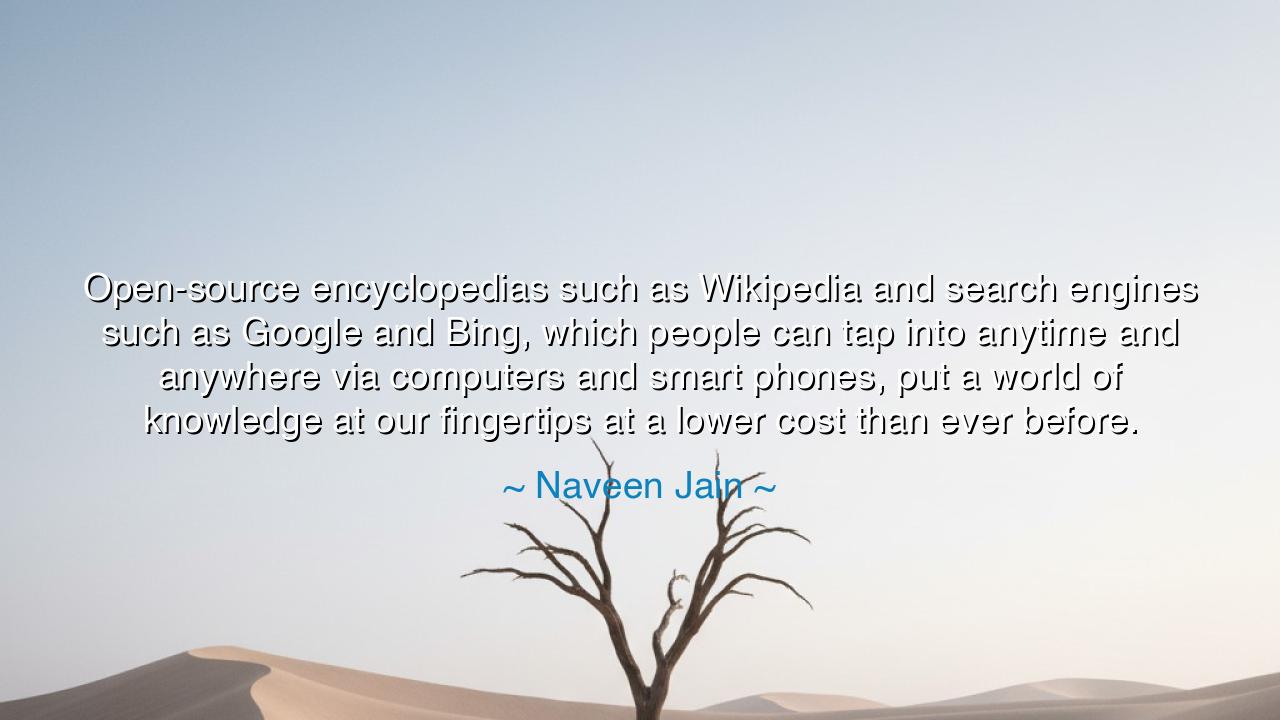
Open-source encyclopedias such as Wikipedia and search engines
Open-source encyclopedias such as Wikipedia and search engines such as Google and Bing, which people can tap into anytime and anywhere via computers and smart phones, put a world of knowledge at our fingertips at a lower cost than ever before.






The visionary Naveen Jain once spoke words that capture the marvel and mystery of our age: “Open-source encyclopedias such as Wikipedia and search engines such as Google and Bing, which people can tap into anytime and anywhere via computers and smartphones, put a world of knowledge at our fingertips at a lower cost than ever before.” In this declaration lies not only an observation of technological triumph but a profound reminder of how far the human spirit has journeyed—from the caves where stories were whispered by firelight to the digital realm where all wisdom burns with the brightness of a billion suns.
From the dawn of time, humankind has hungered for knowledge. It was Prometheus who, in the mythic age, stole fire from the gods and gave it to man—not merely the fire that warms the body, but the fire of understanding that ignites the mind. Every generation since has carried that flame forward, building libraries, schools, and universities, seeking always to illuminate the dark corners of ignorance. Jain’s words remind us that this fire now lives in our hands—in the glowing screens of our computers and smartphones, where once-inaccessible wisdom now flows freely to all.
In the past, knowledge was a treasure kept behind the guarded doors of the few. Only the priests of Egypt, the scholars of Greece, the monks of medieval Europe could read the sacred texts. To learn was to be privileged; to be ignorant was to be bound by fate. But the coming of the printing press, like a thunderclap in history, shattered that wall. Books multiplied, and the power of knowledge began to spread. Yet even then, one had to seek a library, to travel, to pay, to wait. Now, with the rise of open-source encyclopedias and search engines, the wisdom of all ages rests upon the fingertips of every person, rich or poor, young or old, wherever they dwell upon the earth.
Consider the story of Aaron Swartz, the young prodigy who fought to make knowledge free for all. He saw how information—the fruit of human labor and thought—was locked behind walls of profit and restriction. He dreamed of a world where learning flowed like a river, open to everyone. His struggle, though tragic, awakened millions to the truth that knowledge is a birthright, not a luxury. And in this sense, Jain’s words carry the torch of that same vision: a world where wisdom is no longer the privilege of the elite but the shared inheritance of humanity.
Yet with this blessing comes a challenge. For when the floodgates of information open, they bring not only truth but confusion. The ancients warned that too much light can blind as easily as it can guide. To have the world’s wisdom “at our fingertips” is not the same as having it in our hearts. The seeker must learn discernment, to tell the gold from the dust, the eternal from the trivial. The danger of our age is not scarcity of knowledge—but the abundance of noise. The wise must therefore learn not only to seek but to sift, not only to know but to understand.
Still, there is something wondrous in what Jain describes: the union of human intellect across time and space. When one searches a question on Google, they commune with the minds of thousands—scientists, poets, teachers, and wanderers—each contributing their spark to the vast constellation of understanding. , that living manuscript written by many hands, is the cathedral of our collective thought—a testament to the power of shared creation. It fulfills what the philosophers of the past could only dream: that knowledge might one day belong to all who seek it.
Therefore, the lesson of this quote is twofold: give thanks for this era of abundance, but wield its gifts with humility and purpose. Use the tools of knowledge not for vanity, but for enlightenment. Seek to learn not merely to know, but to grow—so that the light you gather might illuminate others. For every question you ask, let there be gratitude for the millions who have labored to answer it. And every time you search, remember that behind each word lies the work of countless souls united by the same timeless desire—to understand.
In the end, Jain’s wisdom calls us to recognize that we stand at the threshold of a golden age—not of wealth or conquest, but of awareness. The libraries of the world are now in our pockets; the wisdom of the ages breathes within our reach. But the true measure of civilization is not how much knowledge we possess, but how wisely we use it. So, seekers of truth, guard your curiosity well, and use it as the ancients used fire—not to burn the world, but to light it.






AAdministratorAdministrator
Welcome, honored guests. Please leave a comment, we will respond soon